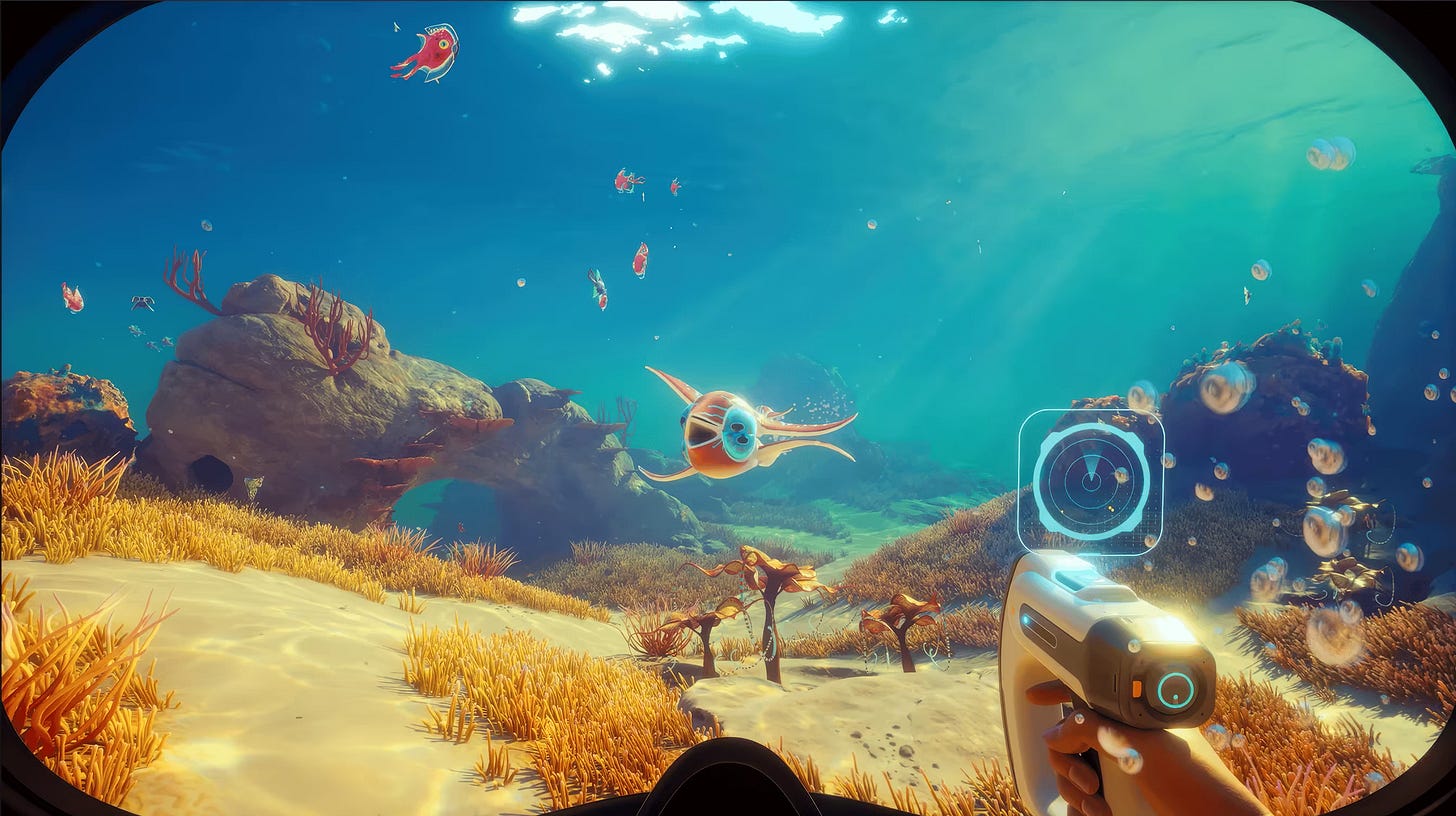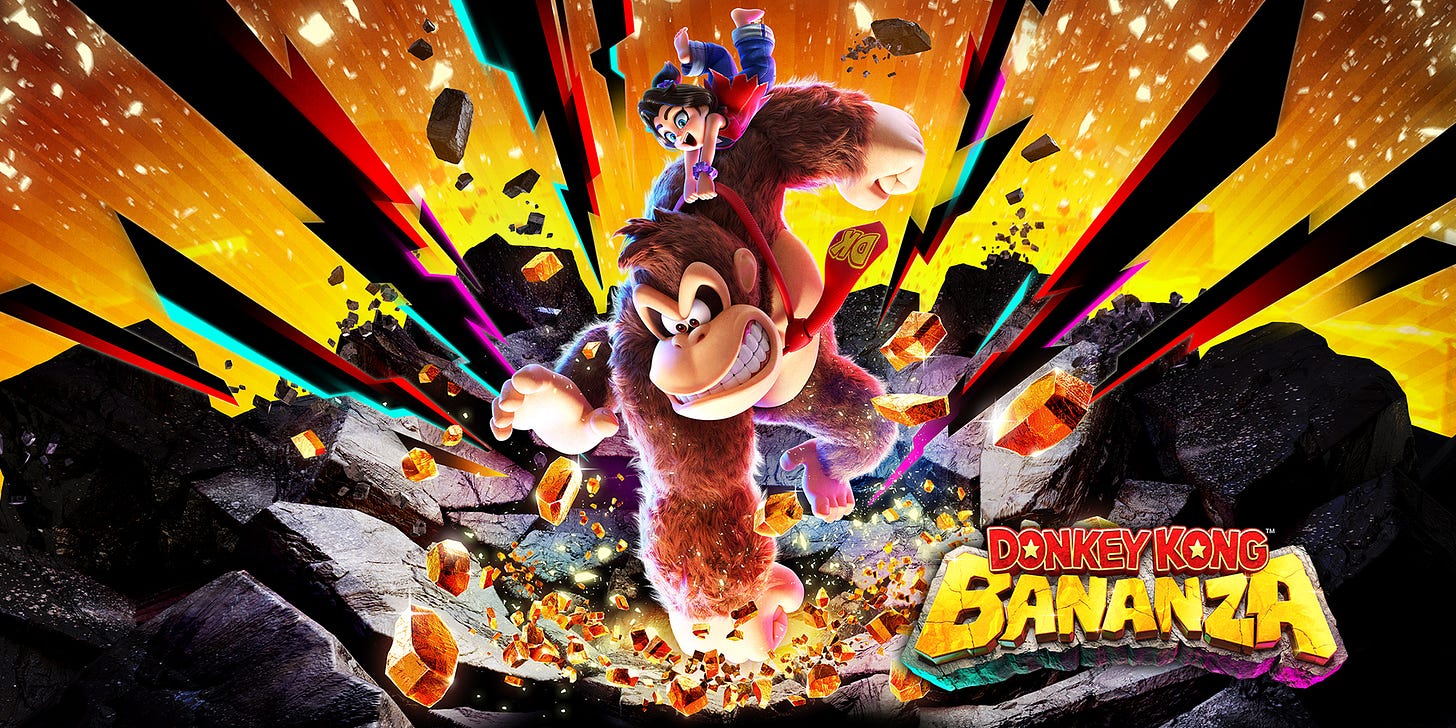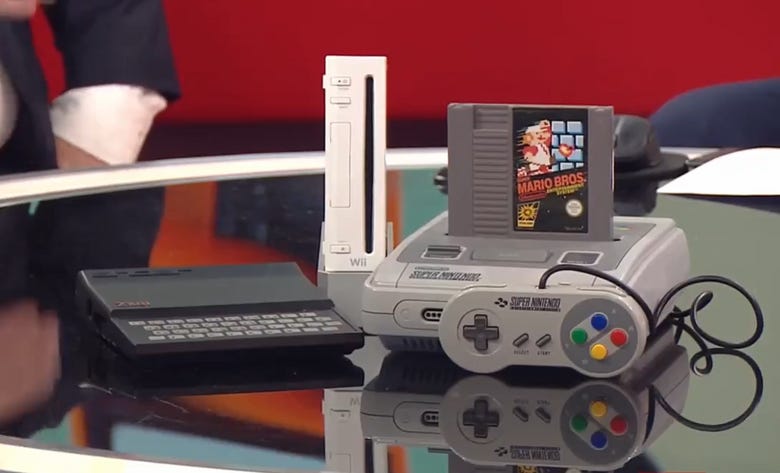Let’s get physical, physical (games), 17/07/2025
Lost in Cult's punt on physical games for a digital age
Hello VGIM-lings,
Other George here back again, filling in for regular George as he puts his nose to the grindstone finishing off Power Play: Video Games, Politics, and the Global Battle for Influence.
And speaking of books, the smoothest transition you’ve ever seen leads us to the topic of this week’s VGIM.
I spoke to Ryan Brown at Lost in Cult, a publisher best known for gorgeous videogame-based coffee table books that has now turned to videogame-based publishing.
Lost in Cult is only just starting out publishing physical games, which might seem counterintuitive in an increasingly digital industry.
Many players saw Nintendo’s introduction of Virtual Game Cards as the canary taking its final sniff of air in the coal mine before kicking the bucket.
After all, if even old-school Japanese companies have decided to step off the physical release game train, then what hope is there for people like me who want to have a stacked collection of video games on their shelves?
Despite the domination of digital everywhere, there is still a vocal and passionate subsection of players who wear their devotion to physical games as a badge of pride.
And in this week’s Big Read, we’re looking at what these players like and how Lost in Cult is trying to reach them.
The big read: Let’s get physical, physical (games)
History lesson: Back in the “good old days” (a historiographically accurate term), video games were so physical you wouldn’t believe it. The first video game, Space War!, could only be played if the US military had sent you a mainframe computer. The first arcade machines were hardware and software incarnate, as demonstrated by the time two unimportant Steves - Jobs and Wozniak - cut their engineering teeth by assembling the Breakout arcade cabinet for Atari. And even though most of our memories of buying boxed games for console or PC drift back a few decades, US bricks and mortar retailer GameStop didn’t reach its peak number of stores until the mid-00s (says Joost van Dreunen in his ace book One Up).
Distributing gains (and games): But things changed, as they often do. Valve got fed up with pushing updates for its PC games via physical publishers and decided to set up Steam in 2003, steadily opening up PC game distribution to the world. Apple and Google gave in to pressure from excited developers to let people flog games via new mobile app stores, adding billions of players and bucks to the game economy via mobile. And despite making most of their cash by flogging stuff in store, consoles started to open up their digital storefronts - spawning approximately one trillion memes/tribute songs based on the Wii Shop theme.
Digital data dearth: The result of all this has been a steady and then rapid nosedive in physical sales across the world. Last year in the UK, the Digital Entertainment and Retail Association (ERA) data found that physical games accounted for just 27.7% of all new console game sales - dropping to 10.4% of all new game sales when PC was included. Sony’s latest financial report painted a similar picture, reporting that it sold 76% of its games digitally; a total that climbs to 88.7% of all purchases if you shove in microtransactions.
Symptoms and causes: This has led to a hefty change in the fortunes of physical games. The biggest game developers are increasingly launching their titles as digital first and, often, physical not at all. Big hitter Alan Wake 2 initially launched as a digital exclusive, rather than risk releasing in box form. Supermarkets are stepping away from selling physical games in stores, depriving kids of the chance to smuggle video games into the weekly supermarket shop. And GAME, the UK’s largest games store, now sells very few games, with only a handful of top-sellers like Call of Duty and EA Sports FC briefly disrupting its new primary business of flogging action figures and merchandise.
Betting on the 1% (the good kind)
Getting physical: For those who love physical media, this might sound disheartening. But with Lost in Cult firmly establishing that there is a market for real books (gasp!) and vinyl records (scream!) based on games, Ryan is optimistic that its success can translate into the games world - provided it is carefully targeted.
The other 1%: “There's always gonna be that demand for physical,” he tells me. “That demand may be 1% of the total game sales, but that's still profitable and where there's profit, there are companies that will want to get in on it.”
Betting on the grown-ups: His optimism is based on three solid hunches guiding Lost in Cult’s approach. The company thinks that the players with the most disposable income are those who grew up with physical video games. This means they have both the desire and buying power to keep physical game publishing in business. This is especially true for players in their late-twenties, thirties and forties who want to be able to physically play the games they’ve collected on their shelves until the day they go up to the big arcade in the sky.
Digital rentership: Next, Lost in Cult is tapping into people who are hesitant about the pitfalls of digital ownership and, in particular, people who feel queasy about the fact that owning digital games feels more like renting than owning. We live in an age where games you’ve paid for can be removed from your console without a refund, something that’s sparked enough dissent across the world to demonstrate that selling stuff IRL has potential (see the News in Brief section for more).
In-deep: Finally, Lost in Cult’s physical publishing arm is not going after the industry big boys; it’s offering something extra to clever indies. The biggest games have always made it to boxes because, well, that’s how games were sold. But physical remains a novelty for indie developers. That makes those developers and their audiences a perfect target for Lost in Cult and its many publishing rivals.
Physical principles
Customer is king: So, we’ve got an idea of the type of person who wants to buy physical games and what they’re likely to pay a premium for. But with a surprisingly large number of indie publishers dashing into the physical market, Lost in Cult needs to show punters that it’ll keep its quality bar high. “The most important thing to me was maintaining good will [with the customers],” Ryan told me. “Both from an ethical standpoint and in a business way. It’s not worth the short-term gain.”
Bad blood: What kind of shonky practices can affect the indie physical games publishing business? Well, formally independent publisher Limited Run Games came under fire for a number of consumer-unfriendly practices, like selling 3DO games on cheap CD-Rs that don’t run on the original hardware. And Nicalis has earned bad blood for holding onto physical copies of VVVVVV and 1001 Spikes since at least 2019, drip-feeding them into the market despite promises to do otherwise.
Oh no, FOMO: The Nicalis situation might seem nuts to someone who thinks that the point of making games is to sell them. But it shows the other side of the value proposition of physical releases to players. Selling games in very limited quantities can be used to induce ‘fear of missing out’ (FOMO) amongst avid collectors. This leads to higher sales in the short term as players and collectors dash to pick up games at any cost. “There's a reason that the other companies work the way they do; FOMO sells,” Brown said, matter-of-factly.
Trade-offs: But FOMO retailing risks annoying buyers, too. Collectors who are willing to pay a premium price also expect a premium consumer experience. Needlessly high prices annoy well-intentioned fans, while artificial shortages let scalpers - the ragamuffins on the internet who sell rare games or hardware for inflated prices - run wild. This is infuriating to lots of physical games buyers, especially because they actually want to pop a disc or a cartridge into a device (and not just leave it in its shrink wrap on the shelf).
Found in Cult
Operating at a premium: For Ryan, not annoying customers is high on the list of priorities. That’s why Lost in Cult’s approach is to lean as closely as possible into the ‘premium’ demand of physical games enthusiasts, balancing the urges of collectors and players carefully against one another.
Live forever: On the creative side, the company has created ‘Editions’ which bundle a physical game with extras like original artwork and developer interviews slipped inside the packaging. “We're telling the story behind the game as well,” Brown explained. “And making it so it’s not just a collectable, it’s also an art piece in itself.” That helps explain why the Editions version of Immortality, Sam Barlow’s mesmerising interactive film video game trilogy, looks particularly gorgeous.
Pushback: Lost in Cult is also deliberately leaning against some of those less popular physical publishing practices too. “We intentionally, and by design, destroyed that FOMO concept, despite [the fact] that the FOMO concept does work,” says Ryan, when discussing the company’s attempts to make sure that anyone who does want a lovely physical treat can get one.
Plug and play: It is also making sure that anything it does publish is playable out of the box and not subject to change. “[We are] working with Does It Play? to make sure that every game doesn’t need internet access,” Brown explained. “All of the game is on cartridge or disc in its final form. We will never relent on that,” he asserted.
Keeping up with the competition: Of course, it will take time to see whether Ryan’s approach with Lost in Cult works in the market. As already mentioned, there is competition in the market for collectable playable independent games. The cost of producing physical stuff is sensitive to a lot of big political considerations, including Donald Trump’s tariff-loving. And even though there is an audience for physical games, it will never be as popular as it once was.
The prestige: But in the same way that the end of the golden age of arcade games in the 1980s hasn’t led to arcade machines going out of business, there’s always going to be a portion of the market that wants to literally get their hands on something. And with those people buying games because they think of them like a work of art, Ryan’s bet that Lost in Cult can “give games the prestige they deserve” sounds like a pretty tight pitch for physical game fans.
You can grab Lost in Cult’s physical Editions of Immortality, Thank Goodness You’re Here!, and The Excavation of Hob’s Barrow for both PS5 and Nintendo Switch.
Become a VGIM Insider for just £3 a month.
Enjoying Video Games Industry Memo? Become a VGIM Insider and help support the next phase of the newsletter.
Insiders receive two extra newsletters, early access to events and 10% off all VGIM purchases (including advertising slots and sponsorships).
You also allow us to support independent writers across the games industry, ensuring that a force that shapes our culture and society gets the coverage it deserves.
And to encourage you to become an Insider, we’re running a special summer sale to give you a discounted membership to the newsletter.
Get your first year of Video Games Industry Memo for just £25 a year - or £3 a month - by signing up before 1st September 2025.
News in brief
Deep trouble: Highly anticipated underwater exploration game Subnautica 2 has been delayed after a punch-up between publisher Krafton and development studio Unknown Worlds led to the departure of three senior executives. Bloomberg alleges that the departure was caused by a disagreement over whether the game was ready for early access this year, something that could have seen the development team land a $250m bonus. Co-founder Charlie Cleveland, one of the directors, has filed a lawsuit against Krafton, calling the situation “explosive and surreal”, suggesting that Krafton needlessly delayed the early access release to hold out on the cash. Krafton, meanwhile, released a statement accusing the executives of ‘betrayal’ for failing to get the game up to scratch. This included sassily accusing Cleveland of spending too much time working on a personal film project. Our nuanced take on this developing legal farrago? FIGHTTTTTTTTTTTTTT.
Parliamentary play: The petition for the Stop Killing Games campaign has hit its deadline in the UK, achieving almost 200,000 signatures. The campaign aims to change the law so that companies must take measures to ensure purchased games remain playable indefinitely. The EU petition ends on July 31, but has already garnered almost 1.4million signatures, including from one of the vice presidents of the EU, Nicolae Ştefănuță. He wrote on Instagram. "I stand with the people who started this citizen initiative. I signed and will continue to help them. A game, once sold, belongs to the customer, not the company." Video Games Europe disagrees.
Candy crushed: One of the biggest casualties of the Microsoft layoffs was Candy Crush developer King, and it looks like our new AI overlords might be to blame. A new report from mobilegamer.biz alleges that dozens of staff in King’s London office will be replaced by generative AI level design tools that they helped build and train, with an anonymous staffer claiming that staff have been laid off after they “spent months building tools to craft levels quicker.” Probably not the best week for Xbox’s head of graphics to pop out some AI slop to advertise new jobs on their LinkedIn profile, then.
Not a pirate's life for me: The FBI has seized several sites that host ROMs for recently released games. One of the biggest targets was Nsw2u, a site which used to host downloadable versions of games for the Nintendo Switch and Switch 2. The FBI claims the sites had a combined total of 3.2million downloads over the last three months that amounted to around $170million in lost profits.
Fundraising done quick: Biannual week-long speedrunning marathon, Games Done Quick has just wrapped up its second mainline event of the year, SGDQ 2025, raising almost $2.5million for Doctors Without Borders. A new Twitch extension allowed viewers to donate to the charity directly via the stream for the first time, making it easier than ever to do good in games.
Moving on
Jess Lanzillo joins White Wolf as Creative Director of the World of Darkness…Steve Papousis is now CEO at Unknown Worlds…Tristan Clark has departed Trailmix to work on a business that plans to achieve “non-profit systemic do-goodery”...There’s a little more Loving at Lego after the company appointed Frederik Loving as Senior VP and Global Head of Lego Game, its gaming group…And Jennifer Estaris has popped up in a consulting role at Netflix advising on its sustainability and games work, as reported in mobilegamer.biz…
Jobs ahoy
Game Informer is looking for a Business Development Manager to manage the developing business…Kinetic Games needs a Head of Operations among other roles to likely work on something spooky…Lost in Cult is hiring a Project Manager to fill Ryan Brown’s big boots…Creative Assembly wants an Environment Art Director and a few other roles to work on the Alien: Isolation sequel…And Lucid Games is hiring a new Executive Producer…
Events and conferences
Bit Summit, Kyoto - 18-20th July
Chinajoy, Shanghai - 1st-4th August
Siggraph, Vancouver - 10th-14th August
gamescom, Cologne - 18th-24th August
XDS, Vancouver - 2nd-5th September
Games of the week
Donkey Kong: Bananza - The Switch 2’s next big first-party IP is the pick of the bunch this week, as Donkey Kong makes his long-awaited return.
Eriksholm: The Stolen Dream - This isometric stealth game threatens us with a good time, blending an up-top view with realistic cutscenes.
Destiny 2: The Edge of Fate - Eight years after the MMO originally launched, Destiny 2 is changing up how expansions and gameplay works starting with The Edge of Fate.
Before you go…
Ukie Chief Exec Nick Poole was presumably delighted to have been invited onto BBC Breakfast earlier this week to discuss the growing market for retro games in the UK.
Unfortunately for him, one enterprising member of the production team decided to whack a NES game cartridge into an SNES for an on-screen prop - leading to honks of derision from video games enthusiasts across the land.
Did the games industry’s outraged response to the error stray dangerously close to “Itchy and Scratchy super fans complaining about continuity errors in a cartoon” territory? Yes.
But do we think that it’s objectively funny enough for us to share with you anyway? Absolutely.








